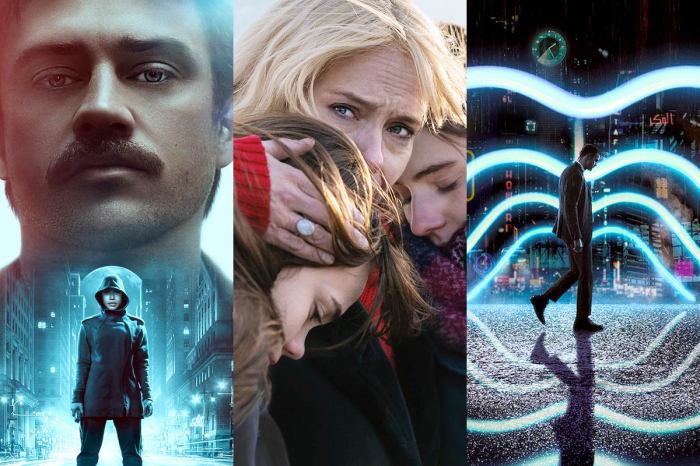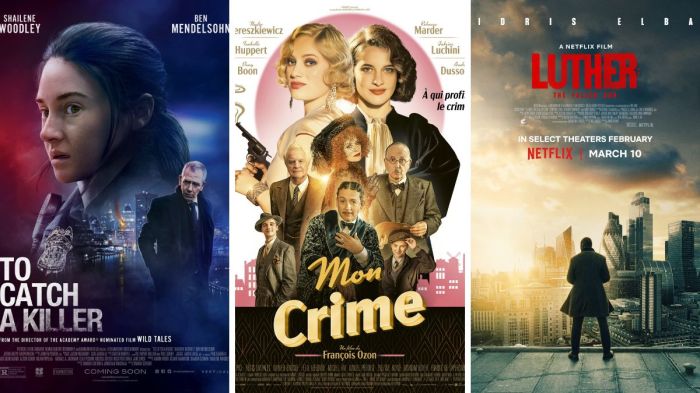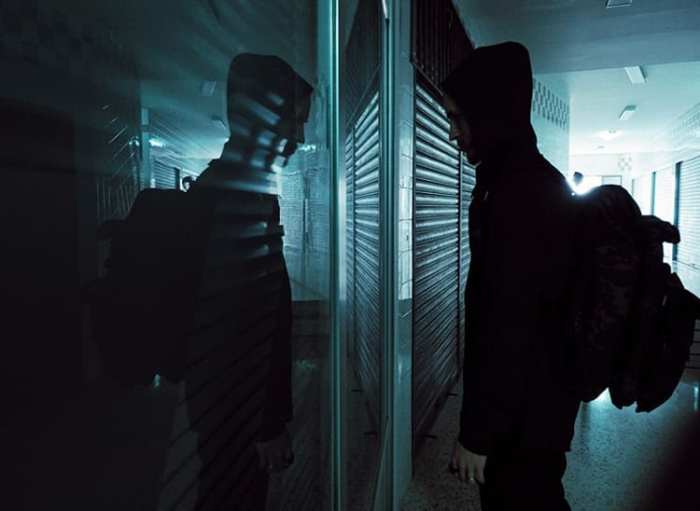A mi las peliculas de misterio – Mystery movies, a genre that captivates audiences with its tantalizing blend of suspense, intrigue, and the thrill of unraveling enigmatic puzzles, have long held a special place in the cinematic landscape. From classic whodunits to modern-day psychological thrillers, these films invite us to embark on a journey where clues, red herrings, and unexpected twists and turns keep us on the edge of our seats.
Mystery movies have evolved over the decades, adapting to changing tastes and technological advancements. From the golden age of Hollywood to the contemporary era of streaming platforms, these films continue to captivate and entertain audiences worldwide.
Popular Mystery Movies

Mystery movies have captivated audiences for decades, offering thrilling plots, enigmatic characters, and mind-boggling twists. Here’s a curated list of some of the most popular mystery movies from different eras:
1940s
- The Maltese Falcon (1941):A hard-boiled private detective, Sam Spade, is hired to find a missing statue, but soon finds himself entangled in a web of deceit and murder.
- Laura (1944):A police detective investigates the murder of a beautiful advertising executive, Laura Hunt, and becomes obsessed with her.
1950s
- Rear Window (1954):A wheelchair-bound photographer witnesses a murder in an apartment building across the courtyard and becomes determined to solve the crime.
- Vertigo (1958):A retired detective suffering from acrophobia is hired to follow a woman who resembles his dead wife.
1960s
- Psycho (1960):A young woman on the run from the law checks into a secluded motel run by a sinister owner, Norman Bates.
- The Birds (1963):A small coastal town is terrorized by unexplained bird attacks.
1970s
- Chinatown (1974):A private detective is hired to investigate a case of adultery, but soon uncovers a web of corruption and murder.
- Murder on the Orient Express (1974):A detective investigates a murder on the famous Orient Express train.
1980s
- The Shining (1980):A family moves into an isolated hotel for the winter, where the father becomes influenced by a sinister presence.
- Blade Runner (1982):A former police officer is hired to track down and “retire” a group of escaped replicants.
1990s
- The Silence of the Lambs (1991):A young FBI trainee seeks the help of a brilliant but manipulative serial killer to catch another serial killer.
- Se7en (1995):Two detectives investigate a series of gruesome murders that are based on the seven deadly sins.
2000s
- Memento (2000):A man with anterograde amnesia must track down his wife’s killer using a series of notes and tattoos.
- The Prestige (2006):Two rival magicians engage in a dangerous game of one-upmanship that leads to obsession and tragedy.
2010s
- Prisoners (2013):A father takes matters into his own hands when his daughter is kidnapped and the police investigation stalls.
- Gone Girl (2014):A husband becomes the prime suspect in his wife’s disappearance, but the truth is far more twisted.
Elements of a Compelling Mystery

Mystery movies captivate audiences by weaving intricate plots, withholding crucial information, and keeping viewers on the edge of their seats. Several key elements contribute to the effectiveness of a compelling mystery.
Suspense
Suspense is the cornerstone of a mystery movie. It keeps viewers engaged and invested in the narrative. Effective suspense relies on pacing, foreshadowing, and misdirection. Pacing refers to the rhythm and speed of the storytelling, ensuring that the tension builds gradually.
Foreshadowing hints at future events without revealing too much, piquing curiosity and anticipation. Misdirection distracts viewers from the true nature of events, creating a sense of uncertainty.
Plot Twists
Plot twists are unexpected turns of events that challenge the audience’s expectations. They can be used to reveal new information, change the direction of the story, or subvert established assumptions. Well-executed plot twists leave viewers surprised and eager to see how the story will unfold.
Character Development
In a mystery movie, character development is crucial for creating relatable and believable protagonists. Audiences need to connect with the characters to care about their journey and the resolution of the mystery. Strong character development provides insights into the characters’ motivations, flaws, and strengths, making them more than just plot devices.
Famous Mystery Authors

Mystery fiction has a rich history, with numerous authors contributing to its evolution and popularity. Here’s a table showcasing some renowned mystery authors and their notable works:
| Author | Notable Works | Writing Style | Major Themes | Impact on the Genre |
|---|---|---|---|---|
| Agatha Christie | And Then There Were None, Death on the Nile | Complex plots, psychological insights | Murder, suspense, justice | Queen of Crime; popularized the whodunit format |
| Arthur Conan Doyle | Sherlock Holmes series | Deductive reasoning, enigmatic characters | Crime, logic, the battle between good and evil | Created one of the most iconic fictional detectives |
| Edgar Allan Poe | The Tell-Tale Heart, The Raven | Gothic atmosphere, psychological horror | Murder, madness, the supernatural | Master of the macabre; influenced the development of horror fiction |
| Dashiell Hammett | The Maltese Falcon, The Thin Man | Hardboiled style, cynical characters | Crime, corruption, the underbelly of society | Pioneered the hardboiled detective genre |
| Raymond Chandler | The Big Sleep, Farewell, My Lovely | Noir atmosphere, existential themes | Crime, morality, the human condition | Master of the private investigator genre |
These authors have significantly influenced the mystery genre, each with their unique writing style and contributions. They have captivated readers with intricate plots, compelling characters, and thought-provoking themes, solidifying mystery fiction as a beloved literary genre.
Mystery Subgenres
Mystery movies encompass a wide range of subgenres, each with its unique characteristics, tropes, and conventions.
These subgenres provide distinct experiences for viewers, catering to diverse tastes and preferences.
Cozy Mystery
- Typically set in small towns or villages.
- Features amateur sleuths, often women, who stumble upon crimes.
- Involves relatively low levels of violence and gore.
- Focuses on solving puzzles and unmasking the killer.
- Examples: Murder, She Wrote, Miss Marple, The Thursday Murder Club.
Hardboiled Mystery
- Set in urban environments, often featuring private investigators or police detectives.
- Characters are typically cynical and world-weary.
- Involves more graphic violence and action.
- Focuses on uncovering corruption and solving complex crimes.
- Examples: The Maltese Falcon, Chinatown, True Detective.
Police Procedural
- Centers around the daily operations of a police department or investigative unit.
- Features a team of detectives or officers who solve crimes through methodical investigation.
- Focuses on the procedures and techniques used in solving crimes.
- Examples: CSI, Law & Order, Blue Bloods.
Psychological Thriller
- Blends elements of mystery and thriller genres.
- Focuses on the psychological aspects of crime, including the motivations and mental states of characters.
- Often involves suspense, tension, and exploration of the human psyche.
- Examples: The Silence of the Lambs, Se7en, Mindhunter.
Historical Mystery
- Set in a specific historical period.
- Features characters and events that are historically accurate or inspired by real events.
- Focuses on solving mysteries within the context of a particular historical era.
- Examples: The Name of the Rose, Cadfael, Grantchester.
Paranormal Mystery, A mi las peliculas de misterio
- Involves supernatural elements, such as ghosts, spirits, or otherworldly beings.
- Focuses on solving mysteries that defy logical explanations.
- Often blends horror and suspense genres.
- Examples: The Conjuring, The Sixth Sense, Supernatural.
True Crime
- Based on real-life crimes and investigations.
- Presents factual accounts of unsolved mysteries, notorious cases, or criminal investigations.
- Focuses on uncovering the truth and exploring the motivations behind crimes.
- Examples: Making a Murderer, The Jinx, Tiger King.
International Mystery Films: A Mi Las Peliculas De Misterio
The realm of mystery extends beyond borders, captivating audiences worldwide with its enigmatic plots and intriguing characters. International mystery films offer unique cultural perspectives and fresh storytelling approaches that add to the genre’s allure.
Películas de misterio siempre me han fascinado, con sus giros inesperados y su tensión constante. Pero más allá de la emoción, estas películas también pueden revelar símbolos profundos, como los símbolos de la unción de los enfermos . Estos símbolos, como el aceite y la imposición de manos, representan la curación, la renovación y la esperanza, recordándonos que incluso en los misterios más oscuros, la luz siempre puede prevalecer.
Cultural influences play a significant role in shaping these films, as local customs, beliefs, and societal norms influence the way mysteries are constructed and resolved. From the ancient traditions of Japan to the bustling streets of Mumbai, each country brings its own distinct flavor to the genre.
European Mystery Films
- The Girl with the Dragon Tattoo(Sweden): A dark and atmospheric thriller that explores themes of abuse, corruption, and the search for justice.
- The Lives of Others(Germany): A gripping Cold War drama that follows the surveillance of an East German playwright and his lover by the Stasi.
- The Killing(Denmark): A complex and suspenseful crime procedural that features a team of detectives investigating a series of murders.
Asian Mystery Films
- Memories of Murder(South Korea): A chilling and unflinching portrayal of a serial killer case that haunted a small Korean town in the 1980s.
- Rashomon(Japan): A classic film that explores the subjective nature of truth through multiple perspectives of a single event.
- Infernal Affairs(Hong Kong): A fast-paced and action-packed thriller about a cop and a mole who infiltrate each other’s organizations.
Latin American Mystery Films
- The Secret in Their Eyes(Argentina): An Academy Award-winning film that follows a retired prosecutor as he investigates a cold case that has haunted him for years.
- The Motorcycle Diaries(Brazil): A biographical drama that follows the young Che Guevara on a motorcycle journey through South America, exposing him to social injustice and political turmoil.
- Amores Perros(Mexico): A gritty and interconnected story of three individuals whose lives are intertwined by a tragic car accident.
The Psychology of Mystery
Mystery movies captivate audiences by tapping into the primal human need to solve puzzles and make sense of the unknown. They evoke a mix of fear, curiosity, and a deep desire for resolution.
Fear of the Unknown
Mysteries often explore our fear of the unknown. The protagonist’s journey into the unknown mirrors our own anxieties about what lurks in the shadows or the hidden corners of our minds. The suspense and tension created by the unknown keep us on the edge of our seats.
Curiosity and Desire for Resolution
Mystery movies also fuel our curiosity and desire for resolution. The breadcrumbs of clues and red herrings tantalize our minds, driving us to uncover the truth. The satisfaction of solving the mystery, whether through the detective’s deductions or our own intuition, provides a sense of accomplishment and closure.
Catharsis and Release
Mystery movies can also provide a form of catharsis. By experiencing the protagonist’s journey through danger and uncertainty, we can release our own fears and anxieties in a safe and controlled environment. The resolution of the mystery brings a sense of closure and relief, allowing us to leave the theater feeling satisfied and renewed.
Adapting Mysteries for Screen

Adapting mystery novels into captivating movies presents unique challenges and requires meticulous techniques. Screenwriters, directors, and actors play crucial roles in bringing these intricate stories to life.
Challenges
- Conveying complex plotlines and character motivations within the limited runtime of a film.
- Balancing the suspense and pacing to maintain audience engagement.
- Translating literary devices, such as inner monologues and unreliable narrators, into visual storytelling.
Techniques
- Screenwriters adapt the novel’s structure, condensing and rearranging scenes to fit the cinematic format.
- Directors use visual elements, such as lighting, camera angles, and editing, to convey the atmosphere and suspense of the story.
- Actors embody the characters, bringing their personalities and motivations to the screen through their performances.
The Future of Mystery Movies
The mystery movie genre is constantly evolving, with new trends and innovations emerging all the time. Technology is playing a major role in shaping the future of the genre, with new ways to tell stories and engage audiences.
One of the most significant trends in mystery movies is the use of interactive storytelling. This allows viewers to make choices that affect the story’s outcome, creating a more immersive and personalized experience. Interactive storytelling is still in its early stages, but it has the potential to revolutionize the way we watch mystery movies.
Another trend in mystery movies is the use of found footage. This technique involves using real-life footage to tell a story, which can create a more realistic and suspenseful experience. Found footage movies have been around for decades, but they have become increasingly popular in recent years, thanks to the rise of digital technology.
Finally, changing audience preferences are also shaping the future of mystery movies. Audiences are increasingly demanding more complex and sophisticated stories, with characters that they can relate to. This is leading to a shift away from traditional whodunits towards more character-driven mysteries.
The Impact of Technology
Technology is having a major impact on the future of mystery movies. New technologies are making it possible to tell stories in new and innovative ways, and they are also changing the way that audiences experience these stories.
- Interactive storytelling:Interactive storytelling allows viewers to make choices that affect the story’s outcome. This creates a more immersive and personalized experience, and it has the potential to revolutionize the way we watch mystery movies.
- Found footage:Found footage movies use real-life footage to tell a story. This can create a more realistic and suspenseful experience, and it has become increasingly popular in recent years thanks to the rise of digital technology.
- Virtual reality:Virtual reality (VR) is a new technology that allows viewers to experience a story from the inside out. This can create a truly immersive experience, and it has the potential to be used to tell mystery stories in a whole new way.
The Changing Audience
The changing audience is also having an impact on the future of mystery movies. Audiences are increasingly demanding more complex and sophisticated stories, with characters that they can relate to. This is leading to a shift away from traditional whodunits towards more character-driven mysteries.
- More complex stories:Audiences are no longer satisfied with simple whodunits. They want stories that are complex and challenging, with characters that they can relate to.
- More character-driven stories:Audiences are also interested in stories that focus on the characters, rather than the mystery itself. They want to know what motivates the characters and what their relationships are like.
- More diverse stories:Audiences are also demanding more diverse stories, with characters from all walks of life. This is leading to a wider range of mystery movies being produced.
Q&A
What are some of the most popular mystery movies?
Some of the most popular mystery movies include The Maltese Falcon (1941), Rear Window (1954), Psycho (1960), Chinatown (1974), The Usual Suspects (1995), and The Sixth Sense (1999).
What are the key elements of a compelling mystery movie?
Key elements of a compelling mystery movie include a well-crafted plot with unexpected twists and turns, suspenseful atmosphere, intriguing characters, and a satisfying resolution.
Who are some of the most famous mystery authors?
Some of the most famous mystery authors include Agatha Christie, Arthur Conan Doyle, Edgar Allan Poe, Dashiell Hammett, and Raymond Chandler.